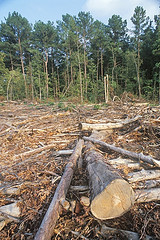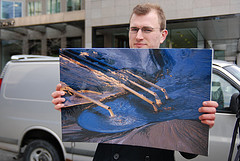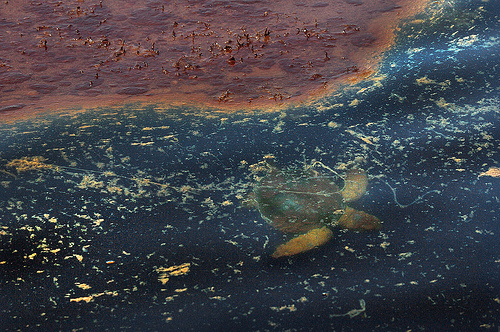Factsheet
Ecocide
It is against the law to steal from or hurt other people, and it is against the law to kill another person. However, it is not currently against the law to wilfully harm the environment for human gain.
What is Ecocide?

Ecocide literally means ‘to kill the environment’.
The word ecocide is made by combining 'eco', which has its roots in the ancient Greek word 'oikos', meaning house or the Latin word 'oeco' meaning 'household' and which over the years has come to mean 'habitat' or 'environment'; ' -cide' comes from the Latin verb 'caedere', meaning 'to cut down' or 'to kill'.
A more familiar word - 'homicide' - means the killing of a human being, with 'homo' in Latin meaning 'a human'.
Ecocide, therefore, is a crime against ecosystems. It could be used to refer to any human activity that substantially damages or destroys the environment. At the moment there is no law criminalising such harm, though many environmental experts are calling for change.
How can you help?
There are many ways that you can help. You can help by talking to others about the idea of a law against ecocide and how it could help prevent or limit further destruction of the environment. You could tell them that this simple law could change the rights of nature forever and give our natural world the protection it needs.
You can also help by thinking carefully about the products that you buy. One of the reasons that companies exist is because we buy or use their products. But it is very hard to know what we are buying, where it comes from, and how it is produced. Food, for example, contains ingredients from all over the world. Some may be sustainably sourced, others such as palm oil may be contributing to deforestation (palm oil can be found in everything from shampoo and pizza to cat food!) We are consumers and we trust companies to have our best interests at heart, but what about the environment's interests? To find out more about how you can help protect the environment visit our factsheet ‘Environment'.
Visit the website below to find out more about ecocide.
Stop Ecocide
Credits
Image: Ecocide by Thomas Hawk
Information sourced from:
Stop Ecocide (November 17th 2020) Top international lawyers to draft definition of "Ecocide" [Online] Available from: https://www.stopecocide.earth/press-releases-summary/top-international-lawyers-to-draft-definition-of-ecocide?fbclid=IwAR06ANHyOFwiT_6WU8DcTduYYVuEbfu0p39sMKEwzrVAPEHLNkwbSA2vbKw [Accessed 23/11/20]
BBC Future Planet, By Sophie Yeo (6th November 2020) Ecocide: Should killing nature be a crime? [Online] Available from: https://www.bbc.com/future/article/20201105-what-is-ecocide [Accessed 23/11/20]
Smithsonian National Museum of Natural History (2013), Gulf Oil Spill [online], Available from: http://ocean.si.edu/gulf-oil-spill [accessed 02/06/2015].
Should Ecocide Be Criminalised?
 It is against the law to steal from or hurt other people, and it is against the law to kill another person. But, is it against the law to destroy thousands of trees and the wildlife that depend on them? Is it against the law to pollute rivers with toxic chemicals and help cause and spread disease? Not yet…
It is against the law to steal from or hurt other people, and it is against the law to kill another person. But, is it against the law to destroy thousands of trees and the wildlife that depend on them? Is it against the law to pollute rivers with toxic chemicals and help cause and spread disease? Not yet…
In recent times, many people from Pope Francis to Greta Thunberg have called for ecocide to be recognised as a crime.
In November 2020 a panel was convened by Jojo Mehta, Chair of the Stop Ecocide Foundation on the request of interested parliamentarians from governing parties in Sweden. This panel full of environmental and legal experts was brought together at a significant time: 75 years after the Nuremberg trials created two other criminal terms ‘genocide’ (to kill a whole group of people based on their nationality, race, ethnicity, or religion) and ‘crimes against humanity’ (deliberate attacks on civilians in times of war or peace).
These laws were created so that humans have the right to live and be safe, happy and healthy. The Stop Ecocide Foundation Panel will work to draft a definition of ecocide and aim to make it a recognised criminal activity, so that the environment will be afforded the some of the same legal protections.
When companies and corporations destroy trees and wildlife and pollute our rivers and oceans they will be harming humans as well as all other species on Earth. For example deforestation doesn’t just destroy forests; it is a leading cause of global warming and this is affecting people worldwide. Industries are polluting our air and our water with greenhouse gases and toxic chemicals, which can cause disease and illnesses such as asthma.
A report published in 2010 stated that the actions of the world's top 3000 companies caused £1.4 trillion of damage to the environment in 2008. To read more about the report click here.
The aim of creating a new law against ecocide would be to make businesses consider the environment more, and to encourage them to protect the health of our planet and all the species, including humans, that call it home.
What Types of Actions would be Punishable Under Ecocide Laws?
Have you heard of the Gulf of Mexico oil spill? In April 2010 Deepwater Horizon, an oil drilling platform exploded, tragically killing eleven oil workers and leaving an oil well leaking thousands of barrels of oil into the sea every day for several months. The oil spill also killed thousands of birds, fish and mammals and affected the livelihoods of those who lived onshore and who fished in the area. The disaster caused lasting damage to the local ecosystem. Dolphin deaths greatly increased (long term impacts are not yet known). Seabird losses may have numbered in the hundreds of thousands, whilst invertebrates were hard-hit too. There were also some reports of deformed wildlife after the spill. Over 1,000 miles of Gulf shoreline was damaged.
In November 2012, BP (the oil company leasing the Deepwater Horizon rig at the time of the accident) and the United States Department of Justice settled federal criminal charges, with BP pleading guilty to 11 counts of manslaughter, two misdemeanours, and a criminal count of lying to Congress. BP and the Department of Justice agreed to a record-setting $4.525 billion in fines and other payments. In September 2014, a U.S. District Court judge ruled that BP was primarily responsible for the oil spill because of its gross negligence and reckless conduct. In July 2015, BP agreed to pay $18.7 billion in fines, then the largest corporate settlement in United States history.
The spill is an example of an activity that would be punishable under more clear ecocide laws. People could be arrested and imprisoned if they were found to be responsible for causing ecocide.

If Ecocide were recognised as a Crime
Campaigners believe that the crime of ecocide should become one of those managed by the International Criminal Court, which can currently prosecute four crimes: genocide, crimes against humanity, war crimes and crimes of aggression.
At the moment, any environmental damage can only be seen as criminal on a global scale if it affects one of these other four areas. It does not currently protect the environment against harm that happens as a result of human activity in times of peace. Individual countries have their own rules and regulations, but campaigners, such as the Stop Ecocide Foundation Panel, believe that environmental destruction will continue on a mass scale until a global law is created.
If ecocide were recognised in global law, then companies and corporations would be held responsible for environmental damage, such as that caused by oil spills, and people from those companies could be arrested for causing damage to ecosystems. They would have to carefully consider their actions in drilling into the sea for oil or clearing forests and pumping toxic waste into ecosystems - they would have to take the environment more seriously and would not escape without serious punishment.
Jojo Mehta, co-founder of the Stop Ecocide campaign, believes that enshrining ecocide in law would also create a change in people’s perceptions of the seriousness of environmental crimes.
“If something’s a crime, we place it below a moral red line. At the moment, you can still go to the government and get a permit to frack or mine or drill for oil, whereas you can’t just get a permit to kill people, because it’s criminal,” she says. “Once you set that parameter in place, you shift the cultural mindset as well as the legal reality.”


 It is against the law to steal from or hurt other people, and it is against the law to kill another person. But, is it against the law to destroy thousands of trees and the wildlife that depend on them? Is it against the law to pollute rivers with toxic chemicals and help cause and spread disease? Not yet…
It is against the law to steal from or hurt other people, and it is against the law to kill another person. But, is it against the law to destroy thousands of trees and the wildlife that depend on them? Is it against the law to pollute rivers with toxic chemicals and help cause and spread disease? Not yet…
